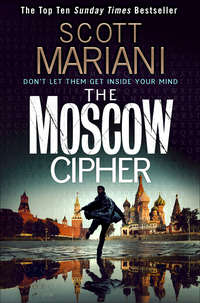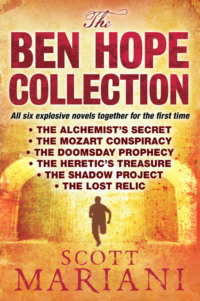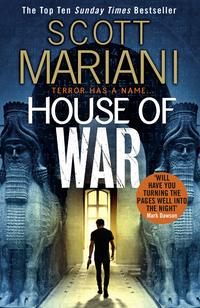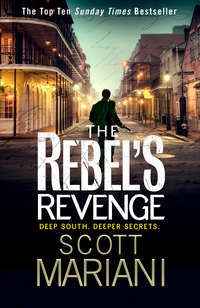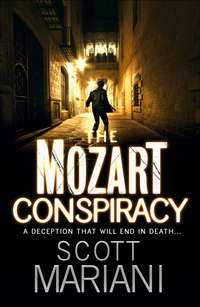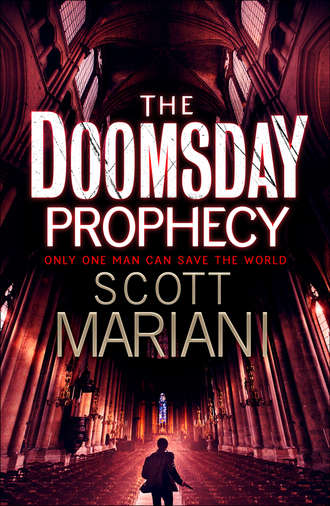
Полная версия
The Doomsday Prophecy
He listened to the twitter of birds and the distant traffic rumble as he made some coffee. No milk, no sugar, nothing to eat. He left the radio off. He wasn’t interested in whatever might be happening in the world. He sat for a while at the small table in his kitchen, the coffee cup hot between his hands, emptying his mind, trying not to think about things. Most of all, trying not to think about the two bottles of ten-year-old Laphroaig in his suitcase – and how easy it would be to walk over there and open one of them. Too easy. He knew he’d get there in a moment of weakness, when the demons came. But this wasn’t it.
At three minutes to eight he stood up, walked back to the living room and found the fabric Tesco shopping bag he’d left on one of the armchairs the night before. He picked up the heavy bag, carried it across the room and dumped the contents out across his desk. Books spilled everywhere.
There were over twenty theology textbooks in the heap, and he’d set himself the task of reading them all in the next few days. Acres of Hebrew and Latin to pore over. Thousands of pages of abstruse philosophy. Aristotle. Spinoza. Wittgenstein. Stacks of essays and interpretations of Bible scripture. It was a mountain of work, and he relished the prospect. It would keep his mind occupied and get him in training for when term began in October. Nineteen years was a long time to catch up on.
He worked for six straight hours, stretched and stood up and then headed for the tiny bathroom. After a quick shower he pulled on a pair of jeans and a white cotton shirt, and ate a stale tuna sandwich that he’d bought at a filling station on the M40 the day before. Sometime after two he left the flat and did the half-hour walk into the heart of the city in twenty minutes. He headed straight towards the Bodleian, the University’s grandest and oldest library, just off the city centre.
The sun was beating down strongly. As he walked, he took off his jacket and slung it over his shoulder.
That was the moment, strolling through the old city under the clear blue sky, when it hit him.
What is this feeling?
He stopped. It was the strangest thing.
I’m just a normal person. I’m a student about to start college, walking to the library. That’s all I am.
Suddenly, and for just one wonderful instant, it all seemed possible. That he could live the simple life he’d dreamed about, far away from the violence and ugliness he’d been immersed in for what seemed like an eternity. That he could be happy again one day, that the pain would come to an end.
It was just a taste of that happiness, a simple taste of normality and freedom and the promise of some kind of life again. He knew there would be more bad days ahead – days when he didn’t even want to go on living. But here, now, for the first time in months, he could feel the sun on his face and he was thankful to be alive. Maybe the worst of the grief was over. Maybe he was coming through. Maybe he was going to be OK.
It was what she would have wanted, he thought. He saw her face in his mind, and felt the loss and guilt stab deep inside him. He wanted to reach out and touch her. Then she smiled, and it made him want to cry but smile too.
Oh, Leigh. I’m so sorry for what happened.
I know, her distant voice replied in his mind.
He was still smiling sadly to himself as he walked through the stone archways of the Bodleian. The main reading rooms smelled of old leather and burnished wood. He approached the desk and showed his card to the librarian.
Twenty years before, the women behind the desk had been notorious battleaxes with intimidating stares that had frightened most of the students. He’d been idly wondering whether he was going to find them still here, greyer, fatter, and even more formidable.
The librarian flashed a smile at him. She was about twenty-eight or twenty-nine, with sandy curls tied up loosely in a ponytail, little wisps hanging down and framing her face. It was a pretty face, open and natural. She glanced twice at his name on the card, and smiled again. He requested the book he was after, and she told him in a low voice that it would have to be fetched up from the bowels of the library.
He thanked her, and spent the next half-hour flipping through periodicals in a booth in the reading-room across from the main desk. Every so often, he was aware that the librarian was glancing over at him. Then another member of staff brought him the book he’d come to read, and he didn’t see her again.
It was late afternoon by the time he left the library. The heat and sweat of the bustling city centre was a strong contrast to the cool silence of the Bodleian reading rooms. He filled his lungs with the smell of the old city.
‘Well, I’m back,’ he said quietly to himself.
Chapter Eight
Greece The fourth day
‘Is this line secure? I have to talk to you.’
‘It’s secure. Why haven’t you reported sooner, Kaplan?’
‘We’ve had a problem here.’
A pause. ‘The girl?’
‘I’m afraid so.’
‘You killed her, didn’t you? You had strict orders to take her alive.’
‘She’s alive.’
‘Then what?’
‘She’s alive but she’s no use to us.’
‘You’re trying to tell me you screwed up.’
‘We had her, OK? She was right in our hands. But she was hard to catch. She was on a motorcycle. We chased her for about three miles, from the villa up into the hills. Those roads are twisty, and there’s a lot of forest. We tried to head her off, but she panicked. She went off the road, where we couldn’t follow. I left Ross and Parker in the vehicle and took Hudson with me. We went in after her on foot.’
‘And she got away.’
‘No. We got her. She didn’t get far before she came off the bike.’
‘What’s the damage?’
‘No serious external damage. A few cuts and grazes. But she suffered a head trauma, and that’s the problem. She was unconscious a long time, nearly thirty hours. Came round yesterday. But she has some kind of traumatic amnesia. She can’t answer our questioning, because her memory has blanked out.’
‘You’re sure you got the right person?’
‘One hundred per cent sure.’
‘How bad is she?’
‘We can’t really say. The amnesia might be short term.’
‘You’d better hope so. Have you any idea how serious this is?’
‘It’s under control.’
‘Doesn’t sound much like that from this end, Kaplan. If she doesn’t regain her memory soon, you’ll have to get her back here where there are proper facilities.’
‘There’s another small problem.’
‘You mean this gets worse?’
‘All her things have disappeared from the villa. We went there to collect everything. It’s not there any more. Luggage, papers. All gone. She wasn’t meant to be leaving until morning. It means we have to replan. It can’t look like an accident any more.’
‘Nice work, Kaplan.’
‘One more thing. There was someone at the party, some boyfriend, we think. He’d been hanging around. We didn’t think anything of it. But then at the party he spilled her drink just after Hudson spiked it. Looked deliberate.’
‘So he knows something. Who is he?’
‘Just a local guy, as far as we know. One of her many boyfriends. Probably married, so he was real discreet. The villa has a linked garage, and he always parked his Mercedes there where we couldn’t see it. Now we think he took her things away, in the car, earlier on. And we’re pretty sure she was RVing with him when we took her.’
‘So he could know everything.’
‘Basically. But there was no way we could have known that.’
‘You have any information at all on this person?’
‘We’re working on it.’
‘You’re going to have to rescue this situation quickly. We’re on the clock here. People will start to miss her.’
‘We’ll find him.’
‘You’d better. And when you do, you contain the situation. There might still be a chance of saving this mess. This goes up in smoke, you’re dead. Understand?’
Chapter Nine
Oxford The sixth day
After two solid days of study, Ben felt ready to breathe some air again. The sun was shining through his window, and he felt the tug of the outdoors. Back in Ireland, he made a point of running ten miles every day.
He put on jogging pants and a T-shirt and walked briskly into town, where he picked his way through the shoppers in Cornmarket and walked down towards his old college, Christ Church. Entering through the main gates, he found himself looking across the vast main quadrangle. He took a deep breath.
He walked across the quad, gazing around him at the regal old sandstone buildings as they caught the gold of the sun. Distant memories flooded back. In the centre of the quad, surrounded by neat lawns and perched above an ornate stone fountain, stood the familiar statue of Mercury the winged messenger. He walked past it, trotted up some steps to the far side of the quad and headed for an arched entrance. Tucked away behind it was the smallest cathedral in England, which doubled as the college chapel. Ben hadn’t planned on going in, but now he felt himself drawn to the place. He slipped in through the door.
At the far end of the cathedral, a morning service was in progress. Ben didn’t recognise the priest in the pulpit, but he was sure he’d be meeting him sooner or later in the course of his studies. The man’s voice was solemn and gentle as he read from the Gospel of St Matthew. His words echoed off the thirteenth-century columns and walls and drifted up to the magnificently ornate ceiling. The small congregation was clustered near the front, listening attentively.
Ben stepped quietly across the polished mosaic floor, took a seat near the entrance and watched and listened from a distance. He tried to imagine himself standing there in the pulpit, wearing the dog collar and that earnest expression, conducting the service. That was his planned future up there: the role he was supposed to be preparing for, something that had been part of his life, on and off, for as long as he could remember.
Sitting here now, it seemed hard to imagine. He’d wanted this thing so much, dreamed of it so often – but was it really within his grasp to make it happen?
He stayed a few minutes longer in the cathedral, bathing in the soft light from the stained-glass windows, head bowed, letting the serene atmosphere penetrate deep inside him. Then he very quietly got up and slipped back outside into the sunlit quadrangle.
He turned left and made his way towards the sprawling meadow behind Christ Church. He jogged for half an hour, making himself feel the burn in his calf muscles as he ran along the towpath by the river. Then, satisfied that he wasn’t letting himself become too unfit, he jogged back towards the college.
He was so deep in thought as he walked back through the main quad that he didn’t see anyone approach.
‘I was hoping I might bump into you,’ a voice said.
Ben turned and saw the tall, grey-haired, tweedy figure of Professor Tom Bradbury approaching. He hadn’t seen Bradbury since his interview six weeks before with the Faculty Admissions board.
‘Professor. How are you?’
Bradbury smiled. ‘Call me Tom. I think we’ve known each other long enough for that.’
Tom Bradbury and Ben’s father, Alistair Hope, had been at Cambridge together. The friendship between a devout theology scholar and a law student might have seemed unlikely, but it had lasted many years and only ended when Ben’s father had died. That had been the year Ben broke off his studies and joined the army. He had few fond memories of that time, but he’d always remembered Tom Bradbury even though he’d lost contact with him all those years ago. As a teenage student he’d come to think of him as an uncle. His presence had always been warm and reassuring, with the aromatic smell of pipe tobacco ingrained in his clothes. His tutorials had been the liveliest of all the classes Ben could remember. His speciality was the Old Testament – scripture that was so ancient and dense and obscure that it was hard to bring to life. But Professor Bradbury could do that, and the students had loved him.
‘I wanted to talk to you,’ Bradbury said. ‘Are you free tomorrow lunchtime?’
‘I had a date with Descartes,’ Ben smiled. ‘But lunch with you sounds a lot more appealing.’
‘Wise choice,’ Bradbury said. ‘Not my favourite philosopher, I have to say. I was thinking you could come over to our place.’
‘Still up in Summertown?’
Bradbury nodded. They agreed on a time, and the professor smiled weakly and headed off towards his rooms in Canterbury Quad. Ben watched him walk away. Bradbury was a sprightly, upright sixty-three. He was normally jovial and full of life, with a mischievous twinkle in his eye. But today he was different. There was something missing. He looked old and weary, subdued. Was he ill? If that was the case, why invite someone for lunch the next day? Something was wrong.
Chapter Ten
Greece
It was a Buck clasp knife, and the fair-haired man loved to sharpen it. When he was sitting out on the balcony with nothing much else to do except soak up the sun, drink Ouzo and watch over the bitch, he would spend hours carefully whetting the blade with an oiled sharpening stone. He had the edge so perfectly honed that he could lie the knife on its back, edge-up, leave a banknote lying across it overnight, and when he came back in the morning the banknote would have cut itself in half with just its own weight.
He took the knife out of his pocket and clicked the blade open with one hand as he walked slowly up to the bed. Her eyes rolled across to look at him, and she let out a stifled cry of terror behind the gag. Her arms were strapped down to the bare mattress. Her fingers were clawing and straining as she struggled.
He rested on the edge of the bed, leaned across her and let her see the blade up close. He could smell the fear coming from her. ‘Looks sharp, doesn’t it?’ He ran his thumb gently down the cutting edge, splitting the first layer of skin. ‘You have no idea how sharp it is. But maybe you’ll be finding out pretty soon.’
He pressed the flat of the blade against her cheekbone, and she drew in a gasp. Her throat fluttered.
‘Now, I’m going to take this gag off, and you’re not going to start screaming again. You’re going to talk to me. You’re going to tell me everything. Because if you don’t, I’m going to put your eye out. Pop it, just like that.’
The dark-haired woman was standing watching from the other side of the bedroom. Her arms were folded and her face was tight. She wanted to intervene, but she checked herself.
The man ripped away the gag. Zoë’s breath was coming in rapid gasps. She swallowed hard, and gave a whimper of terror as he ran the cold blade lightly down her temple and traced a line around her eye.
‘I don’t remember,’ she gasped.
‘Yes, you do. Don’t lie to us.’
‘I swear to you, I don’t remember.’
‘One little push of the blade,’ he said. ‘That’s all it takes, and I’m going to watch that pretty little blue eye come spilling out. You ever seen a burst eyeball? Looks like raw egg.’ He smiled, let the touch of the knife linger on her skin, then drew it away.
She was shuddering with horror. ‘I don’t know what to say to you,’ she sobbed. ‘I don’t know.’
‘Cleaver,’ he said. ‘You remember Mr Cleaver, don’t you? You remember what you did to him?’
She shook her head violently.
‘Where is it?’ he said.
‘Where is what?’
‘Where is it?’ he screamed in her face.
‘I don’t fucking know,’ she screamed back. ‘I don’t fucking know what you want from me!’ Her eyes were desperate, her hair sticking to the tears on her cheeks. ‘You’ve got to believe me! I don’t know anything! You’ve got the wrong person!’ She began to cry harder. ‘Let me go,’ she pleaded. ‘Let me go. I won’t tell anyone. I promise.’
The woman stepped forward and laid a hand on the man’s shoulder. ‘We need to talk.’
He tensed, still staring at the girl on the bed. Then he sighed, turned away and followed the woman out of the room.
They stepped into the hallway outside the bedroom. The woman shut the door, so that Zoë Bradbury wouldn’t hear. ‘This isn’t working.’
‘She’s faking it, Kaplan,’ he whispered furiously.
‘I don’t think you can know that.’
‘Give me half an hour alone with the bitch. I’ll get it out of her.’
‘How? By putting her eyes out?’
‘Just let me.’
‘We haven’t exactly been easy on her. What makes you think you can get it out of her?’
‘I will. Give me more time.’
The woman bit her lip, shook her head. ‘She can’t stay here. We don’t have the facilities. I’m getting her out.’
‘Give me ten minutes with her first.’
‘Negative.’
‘Five minutes. I’ll make her talk, believe me.’
‘You’re enjoying this too much, Hudson.’
‘I’m doing my job.’
‘What if you kill her? Then we’re all dead.’
‘I won’t kill her. I know what I’m doing, Kaplan.’
She snorted. ‘Do you? Listen to me. I want you to put that knife away. If I see it again I’ll put a bullet in your head. Is that completely clear to you?’
The man went quiet, staring at her sullenly.
‘They’ll get it out of her,’ she said. ‘They have other ways.’
Chapter Eleven
The Holywell Music Room, Oxford That evening
Ben leaned back in the hard seat and watched as the audience trickled into the room. The acoustic amplified every sound, and people kept their voices down. He was in the back row and the place was filling up slowly, but he didn’t think the concert was going to draw a big crowd.
He’d spotted the flyer a couple of days before, and he was glad he was here. He wasn’t much of a concertgoer, but the idea of an hour of Bartók string quartets appealed to him. It was the kind of edgy music that made a lot of people restless and uncomfortable, but which he liked. It was moody and dark, introspective, a little dissonant, filled with a tension that somehow relaxed him.
The Holywell Music Room was tucked away down a winding side-street not far from the Bodleian Library. It wasn’t a big or opulent venue, just a plain simple white room with a low stage at one end and capacity for about a hundred people. The lighting was stark and the stepped banks of seats seemed to be designed to be as uncomfortable as possible. The programme said it was the oldest concert hall in Europe, and that Handel had played there in his time. There was a short blurb about the composer and the music, and a little paragraph on each member of the string quartet. They were all postgraduate music students, teaching and gigging their way through college.
The low stage had four plastic chairs, four music stands. The musicians were due out any second. Maybe they’d hold out a few more minutes, hoping more people would come in. But it didn’t look promising.
Ben felt, rather than saw, her walk into the room. He turned, and the first thing he noticed was her smile as she recognised him. The librarian from the Bodleian. Her sandy hair was down over her shoulders, and she was wearing a light jacket that hugged her figure. He laid the programme down on his knee as she came over to him.
‘Are you on your own?’ she said softly. ‘Mind if I sit here?’
His jacket was folded over the back of the seat next to his. He grabbed it and stuffed it down at his feet. ‘No problem,’ he said.
She sat, still smiling. She had a little bag, which she set down beside her. ‘I didn’t expect to see you here,’ she whispered. ‘I’m Lucy, by the way.’
‘Ben.’
‘It says Benedict on your library card.’
‘Just Ben.’
She took off the jacket, and he noticed she was wearing the same crisp white blouse she’d been wearing when he’d first met her. ‘Been working late?’ he said.
She rolled her eyes. ‘Tell me about it.’
He was about to reply when the musicians walked out onto the stage, carrying their instruments. There was a smatter of applause from the small audience as the two violinists, viola player and cellist settled themselves into their seats. They took up their bows, nodding to one another. Then the playing began.
As the edgy music filled the room, Ben became aware of Lucy’s perfume. From time to time she shifted in her seat and he felt her knee brush his lightly. He idly wondered why she’d wanted to sit next to him when the place was half empty. She seemed pleasant enough. He didn’t mind the company.
Sunset was falling as they left the Holywell and walked up the narrow street.
‘I enjoyed that,’ Lucy said.
‘Relaxing,’ he answered.
‘You think? It’s pretty intense.’
‘That’s what I find relaxing.’
‘Fancy a drink?’ she said.
‘Why not?’
The Turf was just nearby, a pub he remembered from years ago. They crossed the road and headed towards the sound of music and laughter. The interior was traditional – low ceilings, exposed beams, with a pitted wooden bar that looked at least two centuries old. The place was heaving with people. A contingent of Italian tourists were taking up several tables, making too much noise. Ben bought a double Scotch and a glass of white wine, and he and Lucy took their drinks out to a tranquil corner of the beer garden surrounded by old stone walls and climbing plants. The air was thick with the scent of honeysuckle.
Ben took out his cigarettes. ‘You mind?’
‘I’ll join you,’ she said. He gave her a light, and they clinked glasses. It seemed a little strange to him to be sitting there with her, yet at the same time she was easy to be with.
‘Great concert,’ she said. ‘Shame about the audience.’
‘I guess Bartók’s an acquired taste.’
‘If it had been Chopin’s greatest hits, or some frilly baroque thing, the place would have been packed out.’ She smiled. ‘So, Ben, are you a postgrad or what?’
‘Undergrad. Waiting to start my final year at Christ Church.’
She seemed surprised.
‘I know,’ he said, catching her look. ‘I’m old.’
‘You’re not old.’
I feel old, he thought. And tired. ‘I took some time out,’ he explained. ‘Did two years of my theology degree, long ago. Too long ago. Now they’ve let me back in to finish it.’
‘Career change?’
‘Definitely.’
‘What did you do before?’
He thought for a moment. Even thought about telling her the truth – then decided against it. ‘I was self-employed. Kind of a freelance consultant. Troubleshooter. Specialist stuff. I travelled around a lot.’
It was meaningless, the vaguest answer he could think of, but she seemed satisfied with it. ‘Career change would suit me too,’ she said.
‘You don’t like working at the library?’
‘It’s OK. But I want to paint. I’m an artist. The Bodleian job’s only a few hours a week, to help with bills. I’d go full time with the art if I could make a living out of it. But things are tight.’
‘Tough business,’ he said. ‘I hope you succeed. What kind of art do you do?’
She chuckled. ‘Oh, you wouldn’t be interested.’
‘No, I am interested.’
She reached into her bag and brought out a business card. On one side was printed LUCY WILDE, FINE ART PAINTER and a phone number and website address. Ben flipped it over. The back of the card was printed with an abstract design, clean and geometric, a style that reminded him of Kandinsky. ‘This is one of yours?’
She nodded.
‘I like it. You’re pretty good. I hope you do well with this stuff.’ He made to hand her back the card.
‘Keep it,’ she said. He smiled and slipped the card into his pocket.




